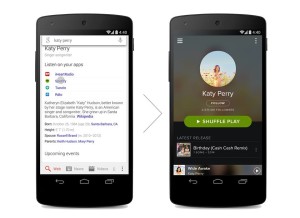 Google highlighted 1B Android active users (vs. 583M last year), a 236% increase in app installs increased y/y, and Google Play Games is now the fastest growing mobile game network with over 100mn users. Since the last IO, Google has paid out more than $5B to app developers ($2.15bn to Google itself). Android tablet now accounts for 62% of global market share (ex-Kindle), up from 46% last year, while the Android One initiative will provide at scale, high quality and affordable smartphones to the next billion to emerging countries.
Google highlighted 1B Android active users (vs. 583M last year), a 236% increase in app installs increased y/y, and Google Play Games is now the fastest growing mobile game network with over 100mn users. Since the last IO, Google has paid out more than $5B to app developers ($2.15bn to Google itself). Android tablet now accounts for 62% of global market share (ex-Kindle), up from 46% last year, while the Android One initiative will provide at scale, high quality and affordable smartphones to the next billion to emerging countries.
Android the OS for Internet Of Things
Google announced the highly anticipated Google Fit Platform, where Fit allows an app to go to Google to get all of users’ fitness data. Fit provides a complete picture of users’ fitness, and blends data from multiple apps and devices. Also, the company announced the availability of Android Wear watches (LG and others) and Android Auto and TV, highlighting Google’s growing relevance in the IoT.
Google Chrome 4 mobile, Chromebooks, Chromecast
The company highlighted 190mn active Google Drive users and now offers $10 per user per month for unlimited storage. Google suggested that 67% of top 100 startups 58% of the Fortune 500 and 72% of the top 100 universities have gone Google (using Google enterprise products). Importantly, Android phones now will support both consumer and enterprise usage all in a single phone enabling data separation.
We are impressed with Android devices becoming increasingly more interoperable. For example: 1) Android Wear watch and Android phones can be used to control the Android TV (Sony, Sharp, TP Vision, and Phillips), which also support Google Cast; Android smartphones, tablets, and Chromebooks will sync (i.e. email or text messages will show up as notifications on Chromebooks); and Android Phone synching with Android Auto. Google is clearly building an interoperable Android ecosystem to try to rival Apple.